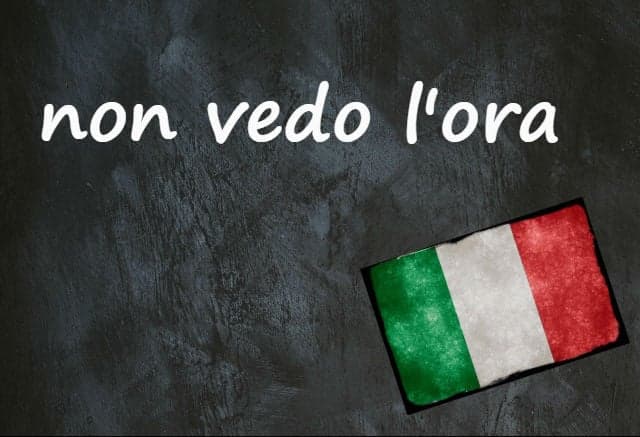Italian expression of the day: 'Non vedo l'ora'

We bet you can't wait to start using this Italian phrase.
If you were to ask an Italian out on a date, they might respond with today's expression: non vedo l’ora
But, since this literally translates as "I can’t see the time", you might understandably think you’d just been turned down with an excuse about a busy schedule.
This is when it really pays to know your Italian idioms, since this phrase actually means “I can’t wait” or “I’m looking forward to it.”
As in, you’re just so excited about this future event that you can’t even "see", or imagine, the time coming.
Isn’t that a bit more romantic than the impatient English "I can’t wait"?
The amorous Italian you met on your last trip to Italy, now separated from you by thousands of miles of ocean, is likely to send messages along the lines of:
- non vedo l'ora di rivederti amore mio
- I can’t wait to see you again my love
They don’t call it the language of love for nothing.
But, obviously, the phrase is also used all the time in all sorts of situations; some of them markedly less romantic.
Some other useful phrases might be:
- non vedo l'ora di finire il lavoro
- I can’t wait to finish work
- Non vedo l'ora di incontrare i miei nuovi colleghi
- I’m looking forward to meeting my new colleagues.
The second example might sound a little off to English speakers. While there's a different between "I can't wait" and "I'm looking forward to it" (the former would imply more yearning or excitement) Italians just use the same phrase for both.
So for English speakers, using non vedo l'ora when you want to politely express that you're "quite looking forward to" getting started on a work project might feel a bit much. But really, it's fine.
To use this phrase in any situation, you can simply add on verbs in the infinitive, just like in English.
Don't forget that, In Italian, ora can be used to mean both ‘hour and ‘time’, as well as "now"
Some examples:
- che ora è?
- what time is it?
- è ora di andare
- It’s time to go
- Stiamo mangiando proprio ora
- We're eating right now
And now you know exactly how to tell people how excited you are about your next visit to Italy:
Non vedo l'ora di tornare in Italia!
Do you have an Italian word you'd like us to feature? If so, please email us with your suggestion.
Comments
See Also
If you were to ask an Italian out on a date, they might respond with today's expression: non vedo l’ora
But, since this literally translates as "I can’t see the time", you might understandably think you’d just been turned down with an excuse about a busy schedule.
This is when it really pays to know your Italian idioms, since this phrase actually means “I can’t wait” or “I’m looking forward to it.”
As in, you’re just so excited about this future event that you can’t even "see", or imagine, the time coming.
Isn’t that a bit more romantic than the impatient English "I can’t wait"?
The amorous Italian you met on your last trip to Italy, now separated from you by thousands of miles of ocean, is likely to send messages along the lines of:
- non vedo l'ora di rivederti amore mio
- I can’t wait to see you again my love
They don’t call it the language of love for nothing.
But, obviously, the phrase is also used all the time in all sorts of situations; some of them markedly less romantic.
Some other useful phrases might be:
- non vedo l'ora di finire il lavoro
- I can’t wait to finish work
- Non vedo l'ora di incontrare i miei nuovi colleghi
- I’m looking forward to meeting my new colleagues.
The second example might sound a little off to English speakers. While there's a different between "I can't wait" and "I'm looking forward to it" (the former would imply more yearning or excitement) Italians just use the same phrase for both.
So for English speakers, using non vedo l'ora when you want to politely express that you're "quite looking forward to" getting started on a work project might feel a bit much. But really, it's fine.
To use this phrase in any situation, you can simply add on verbs in the infinitive, just like in English.
Don't forget that, In Italian, ora can be used to mean both ‘hour and ‘time’, as well as "now"
Some examples:
- che ora è?
- what time is it?
- è ora di andare
- It’s time to go
- Stiamo mangiando proprio ora
- We're eating right now
And now you know exactly how to tell people how excited you are about your next visit to Italy:
Non vedo l'ora di tornare in Italia!
Do you have an Italian word you'd like us to feature? If so, please email us with your suggestion.

Join the conversation in our comments section below. Share your own views and experience and if you have a question or suggestion for our journalists then email us at [email protected].
Please keep comments civil, constructive and on topic – and make sure to read our terms of use before getting involved.
Please log in here to leave a comment.